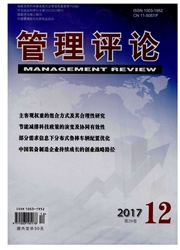

 中文摘要:
中文摘要:
转型经济背景中的捐赠问题一直是社会责任领域研究热点之一。当面对突发性自然灾难时。外部社会环境对企业的社会责任履行产生了强烈预期。然而当前文献忽视了在转型经济背景下本土企业和外资企业由于存在不同的外部环境感知而出现捐赠行为差异的问题。本文基于汶川地震的研究情境,分析了中外资企业在考虑自身战咯资源和外部社会预期的情况下,在捐赠额度、捐赠力度、捐赠反应速度上的行为差异。基本结论是:与由于外资企业在中国市场获得了丰厚利润进而人们预期外资企业应表现更积极不同.本土企业在捐赠额度、捐赠力度、反应速度上都超过外资企业.这一结论与人们的预期相悖。而在捐赠驱动力上.外资企业捐赠的动力更多来自于自身内部的战略资源弹性,而本土企业更多来自于外部的舆论压力。这些结论有助于理解中外资企业在中国情境下不同的社会责任履行行为。
 英文摘要:
英文摘要:
Donation issue in emerging economy has been a research focus in the field of corporate social responsibility. When a firm faces up with a natural disaster, society will have a strong expectation for the firm to donate. However, the existing literature ignores the comparison between Chinese and foreign firms' donation behavior when they have different external environmental understanding in this background. Based on context of Wenchuan Earthquake, we study the donation amount, donation density, and reaction speed to this earthquake on account of internal strategic resource and external social expectation. The conclusions lies that, due to different home country's culture and behavior recognition, Chinese firms donate more money and have bigger donation density and faster reaction speed to the expectation than foreign peers. This conclusion is contrary to general intuition that foreign firms should more actively take part into CSR activities considering that they earn more money. Moreover, there is different motivation for these two kinds of firms to donate. Internal strategic resource elasticity drives foreign firms to donate more and react faster than Chinese firms, and external public opinion will push Chinese firms do more than their peers. Therefore, this study enriches the understanding to Chinese and foreign firms' implementation of corporate social responsibility in China.
 同期刊论文项目
同期刊论文项目
 同项目期刊论文
同项目期刊论文
 期刊信息
期刊信息
